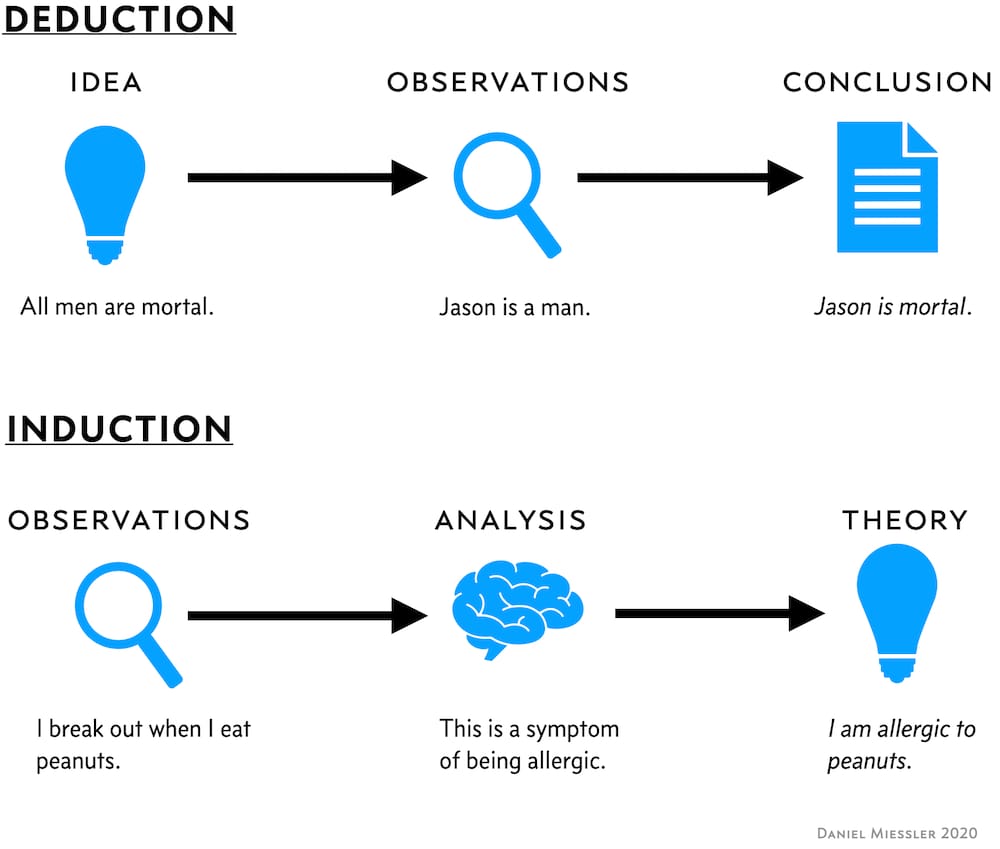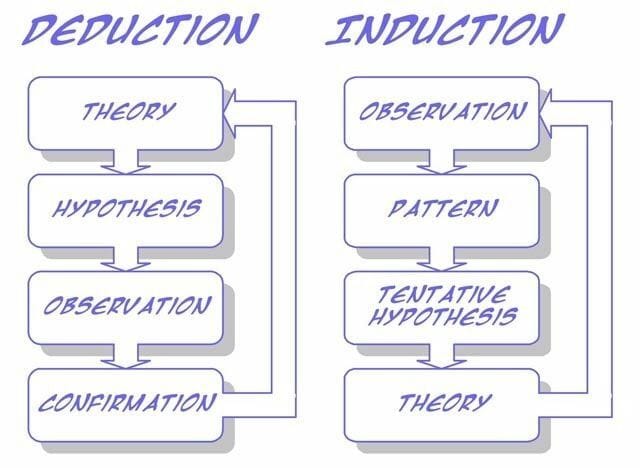The Difference Between Deductive and Inductive Reasoning

Most everyone who thinks about how to solve problems in a formal way has run across the concepts of deductive and inductive reasoning. Both deduction and induction help us navigate real-world problems, such as who committed a crime, the most likely cause of an accident, or how many planets might contain life in the Milky Way galaxy.
But while they’re both practical tools for practical problems, but they approach problem-solving in opposite ways.
Both deduction and induction are a type of inference, which means reaching a conclusion based on evidence and reasoning.
Deduction moves from idea to observation, while induction moves from observation to idea.
Deduction is idea-first, followed by observations and a conclusion. Induction is observation first, followed by an idea that could explain what’s been seen.
The other big difference is that deduction’s conclusions are bulletproof assuming you don’t make a mistake along the way. The conclusion is always true as long as the premises are true. With induction you don’t get absolute certainty; the quality of the idea or model or theory depends on the quality of the observations and analysis.
Examples
All men are mortal. Harold is a man. Therefore, Harold is mortal.
Deduction
This third sentence is absolutely true because the first two sentences are true.
I have a bag of many coins, and I’ve pulled 10 at random and they’ve all been pennies, therefore this is probably a bag full of pennies.
Induction
This gives some measure of support for the argument that the bag only has pennies in it, but it’s not complete support like we see with deduction.
Further clarification
Deduction has theories that predict an outcome, which are tested by experiments. Induction makes observations that lead to generalizations for how that thing works.
If the premises are true in deduction, the conclusion is definitely true. If the premises are true in induction, the conclusion is only probably true—depending on how good the evidence is.
There’s another type of reasoning called Abductive Reasoning, where you take a set of observations and simply take the most likely explanation given the evidence you have.
Deduction is hard to use in everyday life because it requires a sequential set of facts that are known to be true. Induction is used all the time in everyday life because most of the world is based on partial knowledge, probabilities, and the usefulness of a theory as opposed to its absolute validity.
Deduction is more precise and quantitative, while induction is more general and qualitative.
More examples
If A = B and B = C, then A = C.
Deduction
Since all squares are rectangles, and all rectangles have four sides, so all squares have four sides.
Deduction
All cats have a keen sense of smell. Fluffy is a cat, so Fluffy has a keen sense of smell.
Deduction
Every time you eat peanuts, your throat swells up and you can’t breathe. This is a symptom of people who are allergic to peanuts. So, you are allergic to peanuts.
Induction
Ray is a football player. All football players weigh more than 170 pounds. Ray weighs more than 170 pounds.
Deduction
All cars in this town drive on the right side of the street. Therefore, all cars in all towns drive on the right side of the street.
Induction
We can see here that deduction is a nice-to-have. It’s clean. But life is seldom clean enough to be able to apply it perfectly.
Most real problems and questions deal more in the realm of induction, where you might have some observations—and those observations might be able to take you to some sort of generalization or theory—but you can’t necessarily say for sure that you’re right. It’s about working as best you can within a world where knowledge is usually incomplete.
Summary

Deduction gets you to a perfect conclusion—but only if all your premises are 100% correct.
Deduction moves from theory to experiment to validation, where induction moves from observation to generalization to theory.
Deduction is harder to use outside of lab/science settings because it’s often hard to find a set of fully agreed-upon facts to structure the argument.
Induction is used constantly because it’s a great tool for everyday problems that deal with partial information about our world, and coming up with usable conclusions that may not be right in all cases.
Be willing to use both types of reasoning to solve problems, and know that they can often be used together cyclically as a pair, e.g., use induction to come up with a theory, and then use deduction to determine if it’s actually true.
The main thing to avoid with these two is arguing with the force of deduction (guaranteed to be true) while actually using induction (probability based on strength of evidence).